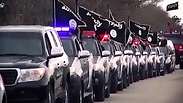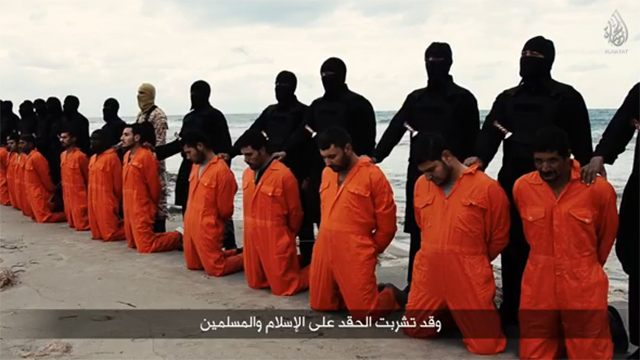
ISIS convoy in Libya. 'Burns every piece of land with a repulsive mixture of fire and blood'
Is this the beginning of the end for ISIS?
Analysis: Within quite a short period of time, the jihadist organization will likely disintegrate into smaller groups, which may still be dangerous but won't constitute a threat to world peace.
In the first speeches in which he addressed the al-Qaeda organization, former US President George W. Bush pronounced its name wrong. He then learned the right pronunciation and sent America on a worldwide war which it eventually won, although not by a knockout: Al-Qaeda withdrew from the West. Most of the organization's senior command and a big part of the field command was either arrested or killed. Its hardcore was inactivated.
There has been an apparent change recently in the way American officials pronounce the name of what is perceived today as the most concrete threat to world peace. No more "The Islamic State" or ISIS, but Daesh, as it is pronounced in Arabic and in Israel. Some believe that the name change is aimed at clarifying that no one is trying to fight Islam. A source in the State Department told me that it was simply "a desire to be more accurate."
But it's not just the name change. A series of military, political and historic circumstances may lead to the conclusion that we are currently witnessing the beginning of Daesh's end.
Daesh came out suddenly, as if from out of nowhere, conquering wide, oil-dripping parts of the Middle East and positioning itself as the current Satan. Like the terrible Huns at the time, Daesh members also burn every piece of land they manage to get a foothold on with a repulsive mixture of fire and blood.
Daesh's barbarism can be likened to one of the "Game of Thrones" episodes in the sense of "anything goes," including the cruelest massacres, as long as they serve their great goal: Gaining more and more control and power (some studies say the similarity is not coincidental: The barbarity of the volunteers who come from the West is absorbed from the television shows they watched there).
For a while, they succeeded. But Daesh made two critical mistakes, turning itself into the West's main enemy. The first mistake was the Yazidi massacre. The shocking reports about it landed on the United Nations Security Council's desk, sparking a major row. The second mistake was, and still is, the public beheading. What the murder of 200,000 people by the Syrian army failed to do was done by "Jihadi John" and his knife. The West launched a military intervention.
It is the fact that Daesh is organized in regular forces, more or less, which makes it very vulnerable in a frontal confrontation with the American military power. The data presented by the American intelligence last week prove it: 2,000 airstrikes; retaking 7,000 square kilometers, about one-fifth of the populated area controlled by Daesh, including the heroic Kurdish battle over Kobani with the aerial assistance of the world's countries, which cost Daesh 1,000 jihadists; depriving Daesh of the use of at least 200 gas and oil facilities it had controlled; seriously disrupting the organization's command and control channels; killing half of the senior command; and hunting the organization's finances and seizing some of them.
These figures shouldn't surprise us. We are talking, after all, about a gang of vagabonds with limited military skills, whose ability to activate sophisticated arms or a weapon of mass destruction, even if they get hold of it, is slim to null. Daesh is much bigger than its ability – in controlling resources, in attempting to manage manpower, in holding on to a very large territory.
It is my assessment that within quite a short period of time, Daesh will disintegrate into smaller groups, which will also be dangerous but will not constitute a threat to world peace.
This doesn’t mean there is no cause for concern. The West's intelligence services are extremely troubled by the issue of the "returning fighting volunteers," as they are called professionally. They will be much harder to defeat.
They will return to their countries of origin with a surging fighting spirit, much more radical than they were when they traveled to Iraq or Syria, with an extensive infrastructure in the social media. They see the world as flat, a convenient leeway for hostile activity.











